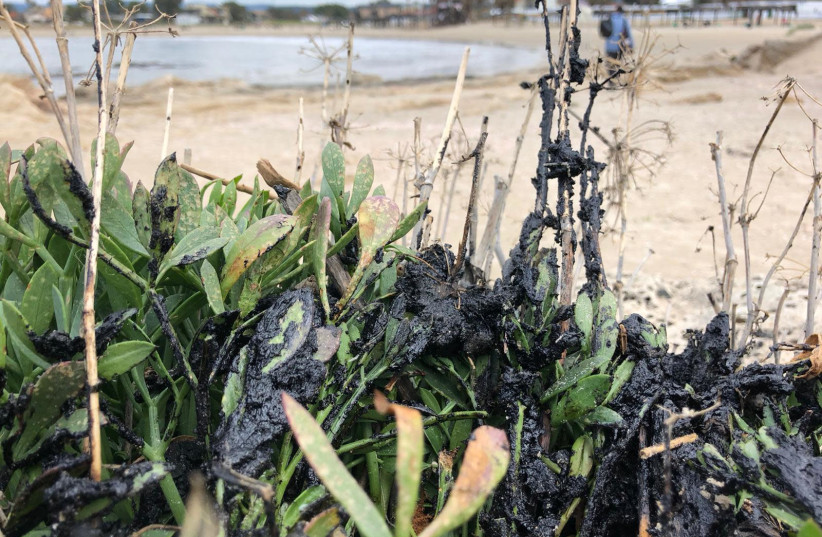President Reuven Rivlin, who also thanked the volunteers, said: “Now is the time for an urgent national plan before we face an unprecedented ecological disaster.”

The image of a baby sea turtle covered in black tar has become the symbol of an ecological disaster that has struck Israel. Huge quantities of tar have been washed onto some 160 kilometers of the country’s Mediterranean coastline, from Ashkelon in the South to Rosh Hanikra in the North.
Yesterday, the Environmental Protection, Interior, and Health ministries called on the public not to go to Mediterranean Sea beaches for swimming, sports or recreational activities until further notice.
While the source of the pollution is not yet fully clear, it is most likely from a ship that either accidentally or purposely discharged large quantities of petroleum offshore which was then washed to the shores in last week’s storms.
Environmental Protection Minister Gila Gamliel said the ministry was examining information from the European Maritime Safety Agency about what appeared to be an oil spill seen on satellite images around a week ago, some 50 km. from Israel’s shoreline. She said one or more of around 10 ships that passed by the site of the spill could be responsible for the event.
On Thursday, the giant carcass of a young whale, some 17 meters in length, washed up on the shore at the Nitzanim nature reserve in the South, covered in tar. The sad sight was an early indication that a disaster was taking place.
Nature and Parks Authority Director-General Shaul Goldstein declared the beach pollution as “one of the most dire we’ve ever seen in Israel.” The clean-up operation will require a long period of time, he noted.
The full extent of the disaster will only become clear in the future, but it is already obvious that the tar, which has covered some unique coastal environmental habitats, will impact the entire food chain as well as the breeding habitats of certain species and could cling to the surfaces of rocks for years to come, particularly in the North.
Much of the clean-up operation needs to be carried out by hand, a physically demanding task made more difficult by the fumes from the tar. Intensive efforts are also being made to save the animals which have been found on the beaches, including turtles and birds – blinded, unable to move their limbs and struggling to breathe.
The response of the volunteers to the disaster was described by many politicians as “heartwarming” – which it was, but nonetheless it is evident that more effort needs to be made to prevent such disasters and to tackle them at a national level when they take place.
President Reuven Rivlin, who also thanked the volunteers, said: “Now is the time for an urgent national plan before we face an unprecedented ecological disaster.”
Several environmental NGOs noted that the government had authorized a National Contingency Plan for Preparedness and Response to Combating Marine Oil Pollution 13 years ago, but the plan was never passed at the legislative stage, leaving funding, equipment and manpower for such emergencies woefully lacking.
Prime Minister Benjamin Netanyahu on Saturday night said the incident was being investigated and that the government was in touch with local community heads. “The tar pollution that struck Israel’s shores is a serious incident, and the pictures of animals covered in tar shocked us all,” he said.
It is sad that it takes a disaster to spur the government into action. The country has been focusing on the coronavirus crisis for obvious reasons, but this is no excuse. The dangers of such a maritime spill, or a leak in a pipeline or a similar source of pollution have been known for decades. The country was not prepared and accidents and incidents that happen out of sight at sea cannot be ignored.
The poor baby turtle smothered in sticky toxic black tar should serve as more than a symbol of what happened last week – it needs to serve as a warning. Even when most of the tar has been removed from the sand and the sea seems to be clean, the ecological impact will be felt for years.Israel cannot rely on dealing with emergencies after they happen. There must be more effort at prevention and immediate, organized response to try to limit the damage. The beaches blackened by the tar are a literal black stain.
https://www.jpost.com/opinion/israel-needs-to-be-struck-by-ecological-disaster-to-take-action-659714
